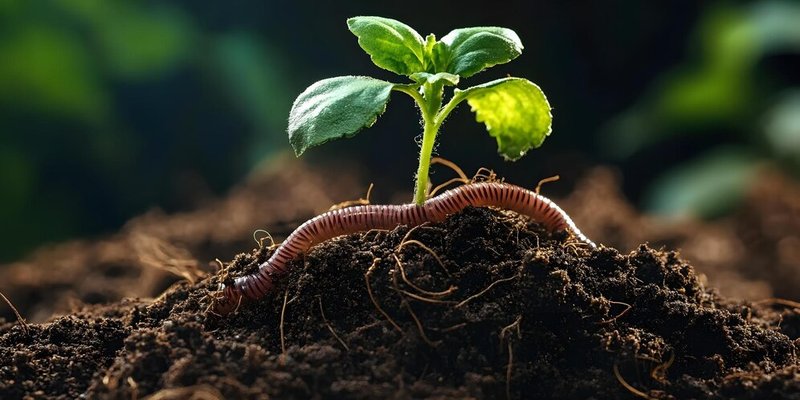
When we talk about plants and their roots, we often think about water and sunlight. But soil quality and structure are just as important. That’s where our slimy friends, the earthworms, come in. They not only improve soil health but also boost root growth in ways you may not expect. So grab your coffee, and let’s explore the underground world of earthworms and their surprising effects on plant roots!
Earthworms: Nature’s Soil Engineers
Earthworms are often called *nature’s engineers*. They burrow through the soil, and in doing so, they create pathways—like tiny highways in the earth. These tunnels allow air and water to penetrate deeper into the soil, making it easier for plant roots to grow. You might be wondering how this actually benefits the roots. Here’s a simple breakdown:
- Oxygen Availability: When earthworms tunnel, they help aerate the soil. This increases oxygen availability, which is crucial for root health.
- Water Movement: Their channels improve water drainage and retention, so roots can access moisture without drowning.
- Nutrient Distribution: Worms help mix organic matter into the soil layers, distributing nutrients evenly for roots to absorb.
The tunnels also create spaces that allow plant roots to spread out, which helps them establish a more robust network. Think of it like expanding your home’s foundation—more room means a stronger build!
The Role of Worm Castings in Soil Fertility
One of the most fascinating things about earthworms is what they leave behind: worm castings. These are basically worm poop, but don’t let the name fool you—worm castings are a nutrient-rich powerhouse for plants. They contain essential nutrients like nitrogen, phosphorus, and potassium, which are vital for root and plant growth.
When worms digest organic matter, they break it down into forms that plants can easily use. Here’s how this all connects back to root development:
- Improved Nutrient Accessibility: The nutrients in worm castings are readily available for plant roots, promoting healthier growth.
- Beneficial Microorganisms: Castings also encourage the growth of beneficial bacteria and fungi in the soil, which can further enhance nutrient uptake.
- pH Balance: Earthworm castings can help maintain a balanced soil pH, ensuring roots can absorb nutrients effectively.
So, if you want your plants to have a nutritious meal, think of adding some worm castings to their soil!
How Earthworms Help with Compacted Soil
Compacted soil is a common issue many gardeners face. It happens when soil particles are pressed together, making it hard for roots to grow. This is where earthworms can be a game changer. Their tunneling action not only loosens compacted soil but also increases drainage and aeration.
You might be thinking, “How do earthworms manage that?” Well, it’s pretty simple. As they wiggle through the ground, they create tiny voids that allow air and water to flow more freely. Here’s what happens next:
- Root Penetration: With improved soil structure, roots can grow deeper and wider, accessing more moisture and nutrients.
- Enhanced Microbial Activity: Aerated soil supports the growth of beneficial microbes that contribute to soil health and root development.
- Resistance to Erosion: Healthy soil with good structure is less prone to erosion, protecting the root systems of your plants.
In essence, earthworms help turn compacted soil into a more hospitable place for roots to thrive.
Earthworms and Soil Moisture Regulation
Moisture is crucial for root health, but too much water can suffocate roots. Earthworms play a big role in regulating soil moisture levels. Their burrowing creates channels in the soil, allowing both excess water to drain away and moisture to be retained where it’s needed.
Here’s how it all works:
- Water Drainage: Earthworm tunnels facilitate drainage, preventing waterlogged conditions that can harm roots.
- Moisture Retention: These tunnels also help retain moisture during dry spells, providing a steady supply of water for the roots.
- Consistent Watering: With improved moisture levels, you won’t need to water as often, which is great for both your plants and your water bill!
In short, earthworms help create a balanced moisture environment, allowing roots to access water without drowning.
The Benefits of Encouraging Earthworm Populations
So, how can you make sure your garden is home to more of these helpful earthworms? It’s simpler than you might think! Here are some effective strategies:
- Compost Usage: Adding compost to your garden enriches the soil, making it more attractive to worms.
- Minimal Tillage: Avoiding excessive tilling preserves the earthworm habitats in your soil.
- Natural Mulching: Use organic mulch to keep the soil cool and moist, which encourages earthworm activity.
By creating a welcoming environment for earthworms, you can significantly boost your plants’ root development and overall health.
In the world of gardening, earthworms might not get the spotlight they deserve, but their contributions to root development in plants are undeniably crucial. From improving soil structure and fertility to regulating moisture and helping combat compaction, these little creatures work tirelessly beneath the surface. If you want to enhance your garden’s health, consider fostering a thriving population of earthworms.
So next time you see a worm squirming in the soil, remember it’s not just a worm—it’s a little hero working hard to ensure your plants grow strong and healthy. Happy gardening!
